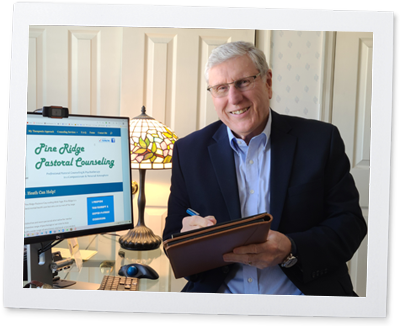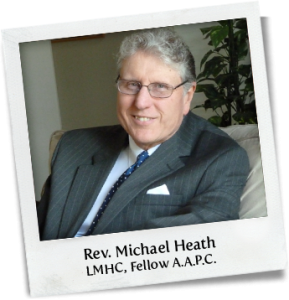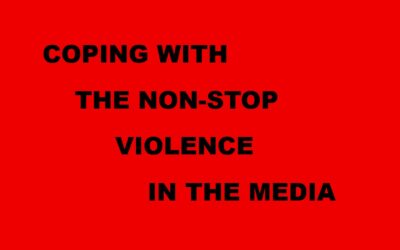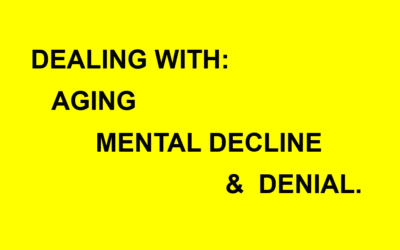Call or text (315) 380-1005 Rev. Heath Can Help!
For your convenience and popularity, all counseling is provided via Tele-therapy.
Hi! I am Michael Heath and this is the Pine Ridge Pastoral Counseling Web Page. Pine Ridge is a place for folks who are looking for the best mental health care but who are turned off by large clinics or impersonal facilities.
Since 1994, Pine Ridge has offered a distinctive and more personal alternative for mental health needs while providing a comprehensive range of psychological services to help individuals, couples and families deal with a wide range of emotional, relational, crisis related, life phase and spiritual problems.
Since I am both a state Licensed Psychotherapist and a nationally Certified Pastoral Counselor, I offer a comprehensive therapeutic approach which can relate to both the psychological and spiritual dimensions of life’s difficulties .
This web site is a great place to learn about my areas of expertise and to find answers to questions you may have concerning psychotherapy, marriage counseling, couples counseling, and other counseling related issues. If you can’t find what you’re looking for, please contact me and I’ll be glad to help.
Helping the people of Central New York since 1978 with:
- ANXIETY / DEPRESSION / OCD
- PTSD / SEXUAL ABUSE
- STRESS MANAGEMENT
- OBSESSIONS / COMPULSIONS
- LOSS AND GRIEVING
- SPIRITUAL CONFUSION / LOSS OF FAITH
- SHAME / GUILT / LOW SELF-ESTEEM
- POOR COUPLE COMMUNICATION
- ARGUMENTS / CONFLICT
- SEX / NO SEX
- PORNOGRAPHY / SEX ADDICTION
- BETRAYAL / INFIDELITY
- SEPARATION / DIVORCE
- MONEY / KIDS / INLAWS

Latest Blog Articles
By Rev. Michael Heath
Violence in the News
Recently, the news has been filled with so much violence that it’s impossible to shrug it off. As the reports from the Israeli/Iran war grow more disturbing each day, breaking news screams the shocking details of the Minnesota shootings.
Although most people aren’t directly affected by these events, the non-stop media coverage wears away our indifference and increases our anxiety. Indeed, a number of recent studies reveal that extended exposure to tragic news reports can cause PTSD-like symptoms.
PTSD-by-proxy includes nightmares, difficulty concentrating, increased anxiety and recurrent flashbacks of disturbing video and still images. Media Exposure and the Risk of Post-Traumatic Stress Disorder Following a Mass traumatic Event: An In-silico Experiment – PMC
Coupled with other brain research, it’s becoming clear that vicarious exposure to trauma can create neuro-pathway damage consistent with what is experienced by deployed soldiers or other trauma victims. This new evidence also provides clues for treating those who are affected by shocking stories in the media.
An update about trauma
Some people wonder how simply seeing something on television or the internet can cause symptoms that are similar to those experienced by those who actually lived through an actual trauma.
Recently, studies have expanded our understanding of what constitutes trauma. We now know that trauma does not have to be physical to be harmful or even directly experienced. Exposure to vivid accounts of trauma can have a similar impact on our emotions as an actual experience.
Tips for Coping
Fortunately, there are several effective tools anyone can employ to reduce the disruptive impact of panic reactions.
The key to dealing with a PTSD reaction is to, first, calm the panic and restore the neuro-pathways to the parts of our brain which can think. Only then can we accurately assess the seriousness of the immediate perceptions and discern from prior experience what response should be made.
Here is a brief list of things to try if you are having problems coping with the news: Coping with the Absurd and the Horrifying Stories in the News | PastoralCounseling Syracuse NY
Counseling: An Update.
Over the years, attitudes about counseling as well as counseling itself have changed. While the stigma connected to counseling may have declined, many misconceptions about it still endure.
In addition, new research has brought significant change to both how we understand and treat emotional problems.
Today, I want to update your understanding and answer some common questions that many folks have about psychotherapy.
AGING and DENIAL
Recently, the release of the audio recording of Special Counsel Robert Hur’s interview of Joe Biden exposed, in painful detail, evidence of the president’s cognitive decline. Biden’s Interview With Hur Confirms What Many Suspected – The New York Times
The tape confirmed what critics of the president had previously alleged. Likewise, it raised a firestorm and accusations of a cover-up. Republicans claimed that Democratic leadership conspired to keep his failing mental status from the American people.
As big as this story has been, I believe its real significance lies elsewhere. Indeed, Joe Biden’s decline shines a spotlight on the larger issue of age-related cognitive decline.
Hopefully, the president’s situation can be a wake-up call for America. We must start talking about this universal human problem: How to understand and deal with age-related cognitive decline that’s gone too far.
Due to its emotionally painful nature, talking about and confronting cognitive decline is often avoided. Here are some thoughts concerning this difficult topic.
Connecting Momments
I’ve been a counselor since 1978 but I have never seen anything like what has been going on over the past few months. People are calling me in the midst of panic, worrying that they are going crazy.
Fortunately, most often, a brief examination of their situation reveals that they are quite sane. Their panic is the result of being overwhelmed by non-stop media-hyped crises.
Specifically, people are freaking out over the impact of Donald Trump’s tariffs and Elon Musk’s chainsaw cuts.
I’m wondering if my experience as a therapist is a symptom indicative of a larger cultural problem ?
Cultural and Technological Stressors
Apart from the scary content of the news, there are two underlying factors that, taken together, explain why the news causes so much distress. 1) the decline of social connections and 2) the growing impact of distressing news delivered non-stop via smartphones.
Urbanization, characterized by declining religious and social groups, has weakened traditional social structures. Likewise, internet technology has reduced person-to-person connections. When combined, these changes have left us feeling less supported and more anxious. Americans Are Socializing Less—Is It Making Us Unhappy? – Newsweek
As our social supports have diminished, the volume of distressing news has increased. Instead of getting our news from Chet Huntley on the Six O’clock News, smartphones and computers bombard us with information throughout the day and night.
The internet and social media overwhelm people with more information than they can process. While life has always been challenging, changes in society and technology have made coping dramatically more difficult.
To make matters worse, the rhetoric in political and social media discourse has become uncivil and abusive. Profanity-laden political comments and unfiltered social media posts have increased polarization, mistrust, and emotional agitation.
Given these changes, it’s no wonder that, when disturbed by unsettling headlines, folks who have fewer places to turn for support feel more stressed.
Taking everything together, it is not surprising that a lot of people feel more depressed and anxious and less able to cope with everyday stressors.
Increasing Social Connection
With all of this in mind, what can we do ? Since May is Mental Health Awareness Month, it’s important to understand that psychotherapy, in addition to treating psychological disorders, also helps people to cope with difficult life stressors.
Besides effective stress-management techniques, people also need a human connection to manage their emotional distress. Fortunately, there is a simple way to experience social connection. While we can’t change culture, it is possible to create brief moments of social connection that can provide a needed lift .. BEING PRESENT | Pastoral Counseling Syracuse, NY
For example, the next time you’re standing at the produce section at the grocery store, waiting in line at the bank, or checking out at Target, you have an opportunity to engage someone and have a connecting moment.
Finding these moments makes you feel good and is also a gift for the other person. Here are the simple steps you can use to help you feel more connected and help someone else, too.
Easter: a Soulful View
With Easter upon us, many take time to reflect on its enduring meaning. For Christians, Easter commemorates the resurrection of Jesus. Apart from Christianity, Easter celebrates the arrival of spring as new life emerges from the death of winter.
In past segments, I’ve written about Easter as a metaphor( Easter as Psychological Metaphor: The Resurrection of Hope and Meaning. | Pastoral Counseling Syracuse NY).
Today, I want us to look at the Easter story, not from a specific theological point of view but from a more inclusive spiritual one that expresses a longing from deep within the human psyche. Easter and Mental Health – Church and Mental Health
THE RESURRECTION STORY
We all know the basics about Jesus’s birth, life, death, and resurrection, viz. he was a man born of a virgin’s union with God, preached love and worked miracles, was crucified, placed in a tomb and, after three days, rose again.
For Christians, based on Biblical text, the resurrection proves both Jesus’s divinity and that faith in Him brings eternal life. Interestingly, these same elements are found in other pagan religions and myths.
Anti-Trans Myths
Recently, I saw a meme (below) that stopped me cold. It deepened my awareness of how vulnerable gay and trans teens are. Worse, it underscored how deadly anti-gay/trans rhetoric and policies can be. The Trevor Project – Suicide Prevention for LGBTQ+ Young People
To be clear, higher suicide rates for gay and trans individuals are not innate. They are directly related to a culture that is non-accepting and abusive. Facts About Suicide Among LGBTQ+ Young People
Despite the gains made for marriage equality, attacks on sexually diverse individuals have recently increased. Specifcally, political rhetoric and discriminatory policies target transgendered people.
It is crucial to understand that the attacks against trans individuals are based on false notions and outright lies. Health Misinformation Monitor: Falsehoods About Transgender People and Gender Affirming Care | KFF
Even though the medical community debunks the lies, politicians and social media continue to spread them. In this highly charged environment, politically hyped paranoia undermines respect for medical science. gay rights | Pastoral Counseling Syracuse NY
Even so, people who support equal rights for sexually diverse citizens must not give up or give in. Given the potential harm, we must continue to confront each false claim as it arises.
To begin, let’s be clear about some basic terms:
— Transgender is an umbrella term for persons whose gender identity, gender expression or behavior does not conform to that typically associated with the sex to which they were assigned at birth.
— Sex has to do with physical sex characteristics.
— Gender refers to the cultural roles of males and females.
— Sexual orientation refers to what sex sexually arouses you. Answers to your questions about transgender people, gender identity, and gender expression
With these in mind, here are some of the most false claims that are used to discredit and malign transgendered individuals.
Affirmations & Self-Esteem
Many people have poor self-esteem. Likewise, many believed that repeating self-affirmations was a way to improve one’s self-regard. Of course, everyone wants and needs self-affirmation, but it is overrated as a therapeutic technique.
Self-affirmation was a big deal in pop psychology 30 years ago. Bookstores and novelty shops promoted it with posters and T-shirts featuring affirming platitudes. Likewise, business offices posted them prominently in waiting areas.
While there is nothing wrong with ego-boosting messages, the value of simply repeating them to yourself is limited. Remember comedian Al Franken? He lampooned and exposed the fallacy of this craze through his SNL character, Stuart Smalley, who began each day by reciting empty self-affirmations.
While, internet apps have pretty much replaced posters, the emphasis is still pretty much the same. SELF: Self-Care & Self-Love – Apps on Google Play Although, self-affirmations are not a bad thing, they can’t take the place of psychotherapy to repair significant self-esteem issues.
Today, I want to review some basic facts about self-esteem and explain how recent research in neuroscience has increased our understanding of how self-esteem can be damaged and why it is so difficult to repair. Within that context, the legitimate place of affirmations can be better appreciated.
RU NDNA DEFICIENT ?
Having just returned from vacation, it's time for my annual segment on leisure and self-care. ABOUT LEISURE DEFICIENCY | Pastoral Counseling Syracuse NY, Specifically, I want to discuss the importance of NON-DEMAND NEURAL ACTIVITY (NDNA). NDNA is a conscious self-aware/observational/experiential activity that does not stress the brain and neural circuitry. In addition, it helps to heal neuropathways damaged by stress. Although the science is relatively new, the wisdom of not stressing activity is ancient. Indeed, the growth in acceptance of meditation expresses Western medical science's high regard for this ancient Eastern practice. Healthy neural activity has even been associated with longevity and avoiding dementia related disorders. Nervous system activity might influence human longevity, neural activity — Harvard Gazette Modern research supports the value of meditation. Activities...
Reconciling Love & Desire
HAPPY VALENTINE’S DAY !
Valentine’s Day is a celebration of romance. Thus, it’s the perfect time to reflect on the complexity and mystery of love and sex.
While its name, Saint Valentine, has a Christian origin, the festival itself began as the Roman fertility festival, Lupercalia. While Pope Gelasius banned Christians from celebrating Lupercalia in the 5th century, the actual observance of St Valentine’s Day did not begin until sometime in the 14th century.
Apart from its historical origins, the meaning of the day is complicated by an ongoing tension between the different meanings of the word love. The Greeks had many words to express the different kinds of love. e.g.:
Philia or brotherly love
Agape, or love for everyone
Storge, or motherly/familial love; and
Eros, or sexual passion.
The real tension among these types of love was between eros and agape. (10 Key Things That Differentiate Love and Desire)
For more recent and past Mental Health postings, visit our Blog archive.











